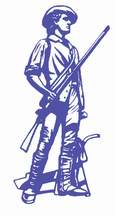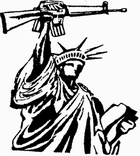Click Here to Puruse the old Flyover-press
Please Click ton Ab
Liberty knows no compromise
Click to Subscribe to Our Free Daily News Service
Donate today to help defray the costs of this important free newsletter
A Universal Ethic for All Mankind: A Detailed Review and Synopsis of The Ethics of Liberty
by Murray N. Rothbard
Chapter 6: A Crusoe Social Philosophy
Compiled and Edited
by
Dr. Jimmy T. (Gunny) LaBaume
“Crusoe Economics” is the analysis of an isolated man face-to-face with nature. It serves to clarify man's actions by abstracting them from interpersonal relationships. Then, later on, this analysis is extended and applied to the “real world” by bringing in one or more other persons into the analysis. This methodology supplies the groundwork for the entire structure of economics and praxeology (the science of human action).
A similar procedure can provide the same thing for social philosophy and can help solve such problems of political philosophy as the nature and role of liberty, property, and violence.
In his isolation, Crusoe discovers himself—his own consciousness and his own body. He finds the natural world around him (which economists sum up in the term “land”). He finds that, in contrast with animals, he does not possess any innate instinct or knowledge—he begins his life knowing literally nothing—all knowledge is learned .
He learns that he has numerous ends and that many of them must be achieved in order to sustain life. He also finds that he has more “advanced” wants beyond mere sustenance. He must also learn how to achieve these wants—e.g. he must he must acquire “technological knowledge.”
Some of his ends may be attained with very little effort. But almost all of them are not satisfied immediately by the natural world. To achieve his ends, he must take nature-given resources and transform them into useful objects.
In summary, he must first choose goals, learn how to use nature given resources to achieve them, and then use his labor to transform these resources into more useful “goods”-- i.e., first into “capital goods,” and finally into “consumer goods.” This transformation of land resources is his “production”—he must produce before he can consume . In contrast to animals, man shapes and alters his nature-given environment through this process.
To learn, he must exercise his powers of observation, abstraction and thought—e.g. his reason. The acquisition of knowledge is the uniquely human method of existence and achievement. It is uniquely the nature of man. Man observes both the external world and his own consciousness (including his emotions) through reason.
What role does reason play in the process of acquiring knowledge? It enables man to learn about the nature of the various entities that he finds in existence. Through it, he learns the natural laws that make things behave the way they do in the world. An arrow can bring down a deer. A net can catch fish. In addition, he learns about his own nature and discovers the events and actions that make him happy or unhappy.
This process is a fusion of “spirit” and matter. Using the ideas it has learned, man's mind directs his energy in transforming and reshaping matter into ways to sustain and advance his life.
In introspecting his own consciousness, man discovers the natural fact of his freedom to choose to use or not use his reason. In other words, he discovers the natural fact of his “free will.” He also discovers the natural fact of his mind's command over his body and its actions—his natural ownership of himself.
The knowledge needed for survival is not innately given so man must use his mind to learn. This fact demonstrates that he is by nature free to employ or not to employ reason—i.e. he has free will.
Man's consciousness, his free will and choice, his reason, his need to learn the natural laws, his self-ownership and need to “produce” are all a part of his “nature.”
Suppose Crusoe has a choice between picking berries or mushrooms. But a long time inhabitant of the island informs him that mushrooms are poisonous. So, Crusoe chooses berries. What happened? Both men have operated on the assumption that poison is bad for the health and survival of humans—e.g. they implicitly agree on the value of life and health and the evils of pain and death. They have arrived at the basis for an ethic grounded on reality and the natural laws of man.
If Crusoe had eaten the mushrooms without learning they were poison, his decision would have been in error based on the fact that man has no guarantee that all of his decisions will be correct—e.g. man is liable to error. On the other hand, if he had known of the poison and eaten the mushrooms anyway (maybe for a “high” or from a very high time preference) then his decision would have been objectively immoral because it would have been a deliberate act against his life and health.
Why should life be an objective ultimate value? A proposition rises to the status of an axiom when those that deny it use it in the course of their denial. Any person that participates in any discussion (including one on values) is, by virtue of participating, alive and affirming life. If that person were opposed to life, he would have no business in the discussion. In fact, he would have no business continuing to live. So, the supposed opponent of life is affirming it by his discussion. Therefore, the preservation and furtherance of life becomes an incontestable axiom.
Some claim that the freedom to choose the course of one's life is illusory because man is bound by natural laws. However, this is a misrepresentation as it is an example of the confusion between freedom and power . Man is free to adopt values and to choose actions. He is not free to violate natural laws. For example, man's inability to “leap the ocean” is not a lack of freedom but is, instead, a lack of power. Power is necessarily limited by natural laws. It is patently absurd to define the “freedom” of an entity as its power to perform an act impossible for its nature.
A man's free will to adopt ideas and values is inalienable. However, his freedom of action to put these ideas into effect in the world is not in a world of more than one person. Since, Rothbard was interested in social and political philosophy he was more interested in “freedom” in this social or interpersonal sense, rather than in the sense of freedom of will.
Back to Crusoe: He finds land that is unused and uncontrolled by anyone—e.g. it is unowned . By transforming land resources into more useful objects, Crusoe “mixes his labor with the soil.” In doing so he has naturally converted the land and its fruits into his property. The isolated man owns what he uses and transforms. What any man produces by his own effort is his property.
As long as an individual remains isolated his property ( ownership) extends over his own body and the material goods, which he transforms with his labor. Suppose that Crusoe had landed on a virgin continent and claimed “ownership” of the entire continent solely by the virtue of his discovery. The natural fact is that his true property extends only so far as his actual labor brought resources into production. His true ownership cannot extend beyond the power of his own reach. Crusoe, in natural fact, owns his own self.
Continue to the next chapter...
*Note: We hold no special government issued licenses or permits. We don't accept government subsidies, bailouts, low-cost loans, insurance, or other privileges. We don't lobby for laws that hurt our competitors. We actively oppose protectionism and invite all foreign competitors to try to under price us. We do not lobby for tariffs, quotas, or anti-dumping laws. We do not support the government's budget deficits: we hold no government or agency securities.
To Subscribe to our daily e-mail alert service, send an e-mail with the word "subscribe" on the subject line.
Visit Our Advertisers
Email for Advertising Rates
Use the link or send an email to: adinfo@flyover-press.com

